advocate-summer-2013.. - The Mill Hill Missionaries
advocate-summer-2013.. - The Mill Hill Missionaries
advocate-summer-2013.. - The Mill Hill Missionaries
- No tags were found...
Create successful ePaper yourself
Turn your PDF publications into a flip-book with our unique Google optimized e-Paper software.
y Sr. Joan Roddy, dmjTHE FAMILIAR red ‘STOP’ roadsign, but bearing the words‘Stop Trafficking in Persons’,was to the fore at Stand 99 atthe last year’s InternationalEucharistic Congress.Reactions of people as they approachedthe Stand varied… Many peoplestopped. Most had questions theywere eager to ask. For some, it wasclearly their first time to engage seriouslywith the issue of human trafficking.Shocked, even horrified, to learn thefacts, they were even more distressed torealise that trafficking of persons is happeningnot just in some far-flung places,but in their own country and maybe evenin their parish. Encouragingly, therewere many too who are acutely aware ofthis form of modern-day slavery and arewell informed about the reality, globaland local. Among those were women,men and young people actively involvedas individuals and groups in initiativesto: ‘Stop Trafficking in Persons’.What is ‘Trafficking in Persons’?Trafficking involves the recruitment,movement and sale of vulnerable persons(women, men and children) through variousforms of coercion or deception. Personswho are ‘trafficked’ are kept inbondage, frequently in appalling conditionsand under threat, to meet serious financialdemands. While the objective issometimes the provision, chiefly by men,of cheap labour, human trafficking involvesmainly women and girls for thepurpose of commercial sexual exploitation:‘how can we not mention the longand degrading history of violence againstwomen in the area of sexuality? ... <strong>The</strong>time has come to condemn vigorously thetypes of sexual violence that frequentlyhave women for their object...’ (Pope JohnPaul II).It is important not to confuse trafficking withsmuggling of persons. Smuggling refers to facilitatingthe illegal entry of persons into another State, usually for financial gain and oftenusing false documentation. Unlike trafficked persons, however, those who are smuggledare left free by the people who facilitated their journey. Because of the hiddenand criminal nature of trafficking, reliable and accurate statistics on it are difficult tocompile. <strong>The</strong> United Nations designates people trafficking as:■ the fastest growing means by which people are enslaved;■■the fastest growing international crime;the third largest source of income for organised crime worldwide, after drugsand arms.It is estimated that every year some 2.5 million persons are trafficked around theworld, involving some €24 billion. Despite the enormity of the sums of money involved,it is alarming to see that some trafficking groups are now switching fromdrugs to human beings in search of high profits at low risk. Drugs, once sold, aregone; persons can be sold and re-sold. In the words of Pope John Paul II: <strong>The</strong> tradein human persons constitutes a shocking offence against human dignity and a graveviolation of fundamental human rights.23



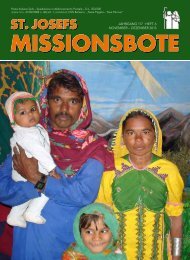
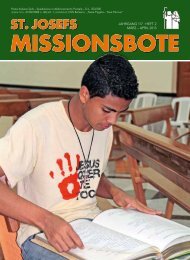
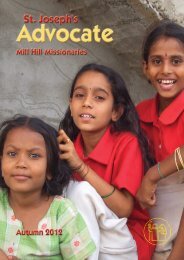



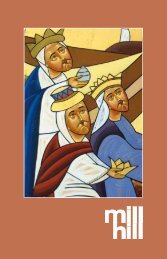
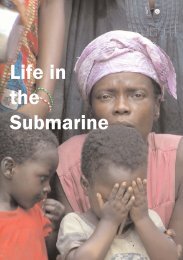
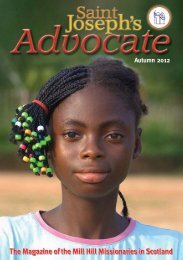
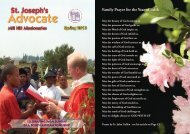
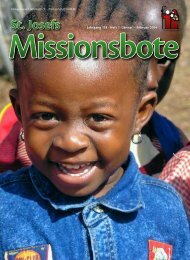
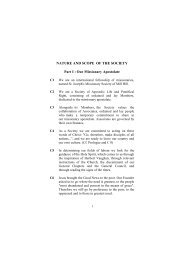

![Summer 2012 [pdf] - The Mill Hill Missionaries](https://img.yumpu.com/43011464/1/184x260/summer-2012-pdf-the-mill-hill-missionaries.jpg?quality=85)